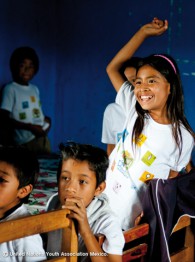
About the Project
This project is one of the 2016 WISE Awards finalists.
Sports for Sharing (S4S) is a civic educational program that uses the power of play and sport to trigger active citizenship resulting in local development child-led projects. S4S runs for a school year and it is designed for children ages 6 to 15. It is built using the socio-constructivist approach, which allows students to internalize the world’s global challenges in a simple way through play and sports. Afterwards, they reflect on how these problems impact their community to come up with innovative ideas to mitigate them through the management of projects.
Collectively, children decide which community issue concerns them most, name a project manager, design a project calendar, manage a budget; and ultimately, execute their project. An innovative component of S4S is the incorporation of the Global Agenda of the United Nations, as educational content. S4S operates in all types of educational spaces, private, public, urban and indigenous boarding schools. It has been implemented in the 32 Mexican states, the USA, Guatemala, Argentina and the Dominican Republic.
Context and Issue
Sports for Sharing address many challenges related to childhood in the Americas. For example, each year, about 600,000 suicides take place in the world by causes attributed to bullying (WHO, 2013). S4S invites students to strengthen peaceful relations by using teamwork as a value to share solutions and solve problems in their own communities. Worldwide, more than 42 million children under five years are overweight (WHO, 2012). S4S encourages the practice of healthy lifestyles, thus undertaking overweight. Some 57 million children in the world between the ages of 6 and 12 do not attend school (UN Millennial Goals, 2015). S4S methodology is designed to impact any educational space, not only schools, offering an inclusive solution. Some examples are indigenous boarding schools, urban shelters, and care centers for children infected with HIV.
Latin America is losing forests twice as fast as the global rate (ECLAC, 2010). S4S raises awareness to avoid pollution and deforestation and promotes recycling culture for environmental preservation.
Mexico received a score of 35 out of 100 in corruption perception, ranking 103rd out of 175 countries (Index of Corruption Perception 2014). The knowledge and practice of the civic values that S4S promotes create an environment of fair play within classrooms.
Solution and Impact
S4S uses a win-win philosophy based on collaborative work that breaks individualist practices and generates harmonic social development. The program’s operative model includes local facilitators from each community in which S4S works. They receive a mixed training methodology that includes e-learning theoretical platforms, video training and face-to-face sessions. Their responsibility is to train teachers and track the correct implementation of each project with the required quality, involving people from the community in a participative program and fostering local employment.
S4S has seen several examples of positive impact at the various locations in which the project was implemented. In the State of Mexico there was an increase of 90 percent in the knowledge of global challenges and the responsibility children feel to solve those (2011). In Hidalgo, Mexico, school violence decreased 35 percent (2014). In Guatemala, there was an increased practice of civic values of 24 percent (2014). The practice of empathy increased 40 percent in Dominican Republic (2015). In Argentina the gender equality practice increased 28 percent (2015).
As a result of this awareness S4S children have been creating excellent initiatives. An example is “Super Trash”; a 9-year-old boy named Karim created this superhero whose mission is to pick up garbage and recycle. He also shared with his schoolmates and community the importance of environmental care by creating a comic book.
Future Developments
The organization has a diverse sustainability plan that includes an international expansion strategy based on the foundation of offices in each country in which it operates. That will reduce costs and will make more efficient local coordination. Each office has a fundraising department to make it self-sustainable.
In parallel, the organization is seeking to attract numerous recurring donors to cover its fixed costs. There are two strategies running to accomplish this goal. The first is a corporate matching program. It involves inviting the employees of a company to donate month by month, while the company matches the quantity raised. The second is a permanent Face-to-Face campaign, which consists of inviting people on streets to donate recurrently to keep strengthening the sustainability of the organization and benefit more children. Both campaigns are showing exceptional results.


